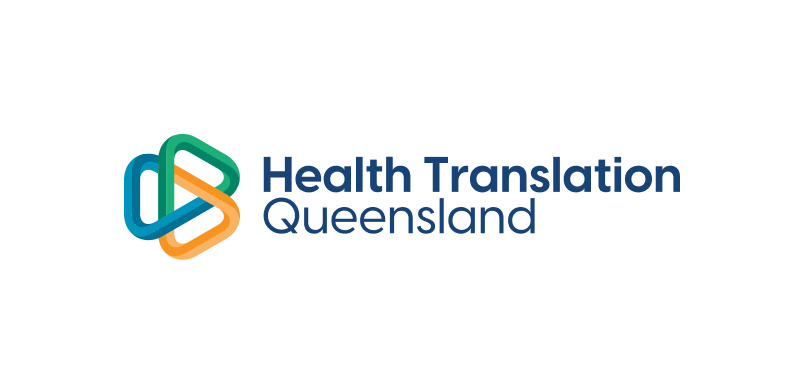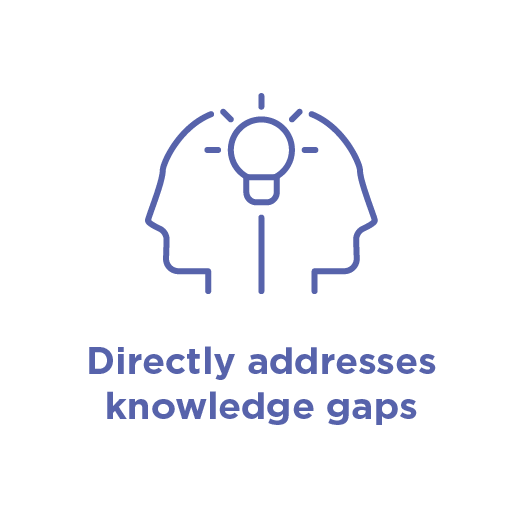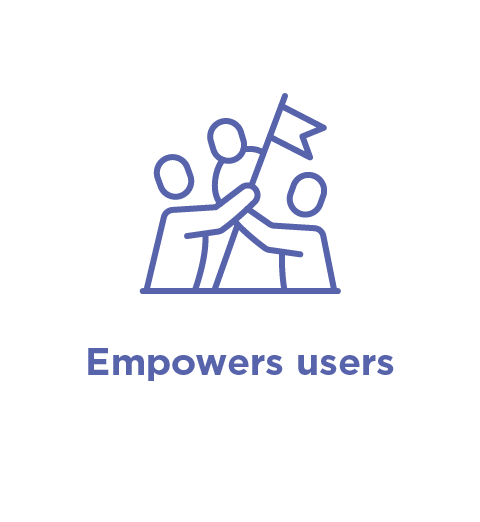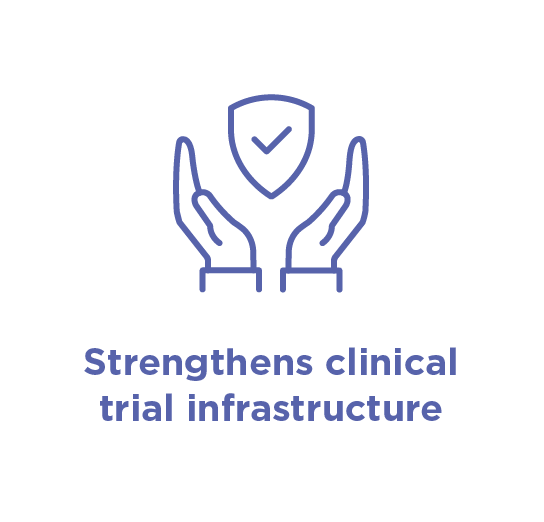Health Translation Queensland is an NHMRC-accredited Research Translation Centre. We collaborate to deliver research-informed healthcare and training. The below case studies highlight our work in translating research into better health outcomes and building capability across the system.
Case studies on this page:
- Developing, re-designing or adopting platforms, systems or workforce initiatives: A best-practice Clinical Trials Hub to build clinical trial capability and capacity.
- Providing better care: Supporting and growing Queensland's mental health workforce
- Meeting the needs of your end-users in your population: Facilitating the involvement of consumers in the early stages of research project planning

Case studies from all Research Translation Centres are available from Impact and Outcomes.
Developing, re-designing or adopting platforms, systems or workforce initiatives: A best-practice Clinical Trials Hub to build clinical trial capability and capacity
Challenge
Supporting clinical trials, especially investigator-led trials, has long been a strategic priority for the partners of Health Translation Queensland (HTQ).
Through stakeholder engagement across the Queensland research ecosystem, a consistent challenge emerged: early career researchers and those conducting trials for the first time lacked access to consolidated, best practice information on how to start and manage a clinical trial. Many expressed not knowing where to begin and highlighted the lack of practical guidance. Concerns were also raised about the loss of knowledge across the system due to workforce turnover.
Approach
To address this capability gap, HTQ developed and launched the HTQ Clinical Trials Hub in September 2024.
The Hub is a comprehensive, online platform designed to support researchers and trial teams at every stage of the clinical trial lifecycle. Co-developed with leading clinical trial experts from across Queensland, the Hub consolidates a range of high-quality tools and resources to support knowledge sharing and workforce development.
A key feature of the Hub is the My Clinical Trial Planner – a free, interactive tool designed to guide users through the clinical trials process.
The Planner offers:
- Structured workflows with practical information and checklists
- The ability to personalise trial plans, add custom steps, and collaborate with team members
- Progress saving functionality for registered users
- Ability to track and manage trial activities in real time.
Significance
The Clinical Trials Hub directly addresses knowledge gaps and workforce capability challenges identified by stakeholders (trialists, clinicians, researchers and consumers). It empowers users, particularly early career researchers, by providing the tools, and information to support the design and management of high-quality trials. The Hub strengthens clinical trial infrastructure and helps mitigate the impact of staff turnover by centralising access to best practice knowledge and resources.



Value-add of centre
HTQ’s collaborative and system-wide approach has enabled the development of a resource that is both practical and scalable. The co-design process with clinical trial experts ensured the content is relevant, accurate, and applicable across a range of trial contexts, namely hospital, primary, community and research environments. HTQ’s role as a collaborative partnership was instrumental in bringing together diverse expertise, aligning health service priorities, and responding rapidly to identified gaps. Moreover, the Hub has proven adaptable beyond its initial audience, with growing interest from industry partners and national stakeholders.
This demonstrates HTQ’s ability to develop responsive, fit-for-purpose platforms that add long-term value to the broader research and clinical trial ecosystem.
Reach
Since its launch, the Hub has seen significant uptake and sustained engagement:
- Close to 16,000 users and 36,500+ page views within its first year
- Currently 290 clinical trials are registered on the My Clinical Trials Planner tool
- Strong 57%+ engagement rate, exceeding typical digital engagement benchmarks.
Next steps
Based on strong user engagement and their feedback, HTQ will:
- Broaden the scope of materials to meet the needs of both investigator-led and industry-sponsored trials
- Engage with national partners to explore integration opportunities within broader workforce development and clinical trials initiatives
- Explore complementary training programs and/or communities of practice aligned with the Hub to further support capacity building.
Providing better care: Supporting and growing Queensland’s mental health workforce
Challenge
In 2022, Health Translation Queensland (HTQ) conducted a comprehensive Health and Research Needs Assessment (HRNA), which identified mental health as one of the top 9 priority areas for the state. Mental health places a significant burden on society and our health care system; in 2020–2022, 23.7% of Queenslanders 16 to 85 years experienced a mental disorder in the past 12 months.
One of the most pressing challenges raised was the critical workforce shortfall: a current gap of 32%, projected to rise to 42% by 2030. These figures align with national findings outlined in the National Mental Health Workforce Strategy 2022–2032.
While there are numerous consumer-facing mental health resources available, stakeholders highlighted the absence of a centralised, Queensland-based platform focused on training, education and research for the current and prospective mental health workforce.
Approach
To address this gap, HTQ led the design and development of the Mental Health Workforce Hub, which was launched in October 2024.
The Hub is a publicly accessible, online platform providing curated information, training opportunities, education pathways and research resources for mental health professionals and researchers. It was developed through a co-design process, whereby a Mental Health Collaborative Group was established, made up of subject matter experts from HTQ’s 13 partners and other key sector stakeholders. Feedback from end users directly shaped the platform’s design and content.
Significance
The Hub is a unique and sector-led digital resource, designed by the workforce, for the workforce. It supports workforce growth, development, and retention by providing practical, relevant, and up-to-date resources in a central location.
One of the Hub’s most popular features has been the career pathways and career profiles section, which showcases the diversity of roles and professional journeys in the mental health sector. The Hub also highlights training opportunities and connects users with evidence-based research and resources.
Post-launch analytics show high levels of engagement with this content, particularly from those exploring mental health as a potential career path – highlighting the value of this resource to drive growth in the state’s mental health workforce, which is critical to delivering high-quality, evidence-based mental health care.
Value-add of centre
HTQ’s ability to coordinate cross-sector collaboration and mobilise its extensive network was instrumental to the success of the project. The creation of the Mental Health Collaborative Group brought together diverse expertise from across the state and ensured that the content was grounded in health service and system needs.
As a trusted system connector, HTQ was able to facilitate a co-design process that was inclusive, responsive, and fast-tracked through existing partnerships.
Reach
The Hub is already reaching a wide user base and has become a go-to resource for learning about the many career pathways and opportunities in mental health, including those in non-clinical and community-based roles.
The Hub also plays an important role in supporting workforce growth in rural, regional, and underserved areas, by providing access to resources regardless of location.
Next steps
HTQ is committed to ensuring the Hub remains current and responsive to the evolving needs of the sector.
Key areas of focus include updating and expanding content – particularly through the planned addition of new career pathways.
To ensure the long-term sustainability and continued relevance of the Hub, HTQ is also seeking opportunities for partners or mental health related organisations to take on future platform maintenance.
Meeting the needs of your end-users in your population: Facilitating the involvement of consumers in the early stages of research project planning
Challenge
Embedding effective consumer and community involvement at the early stages of research, including for health service improvement, remains a significant challenge. This is particularly difficult when projects are still in the planning phase prior to securing research funding, making it difficult to appropriately remunerate consumers for their time, expertise and lived experience.
Without support, researchers often struggle to embed meaningful consumer and community involvement into the foundational stages of their research, where it can have the greatest impact.
Health Translation Queensland (HTQ) identified this gap through its consumer and community involvement audit and needs analysis.
The consumer and community involvement audit and needs analysis was based on desktop research and stakeholder engagement with researchers, clinicians and policy makers. Addressing this need is essential to improving the relevance, equity and impact of both research and health innovation efforts.
Approach
To address this identified gap, HTQ launched the Consumer and Community Involvement Microgrants Program in May 2022. The program provides small grants (up to $1,000) to support consumer and community involvement during the early phases of research, particularly in project ideation and priority setting. The scheme was open to HTQ partners and other eligible organisations, with applications assessed against criteria aligned with HTQ’s Strategic Plan, including commitment to high-quality consumer and community involvement practices, evidence of collaboration across organisations and disciplines and value for money.
Additional weightings were given for those research projects that aim to address the needs of underserved communities, such as Culturally and Linguistically Diverse populations, First Nations, regional, rural and remote, and the challenges faced within primary care.
Significance
Between 2022–2024 HTQ awarded 67 microgrants. The program was paused in 2024 to conduct an evaluation. The findings from the evaluation clearly demonstrated the program’s value and impact:
- 93.5% of respondents reported that the funding was very helpful to their research project
- 54.3% reported that consumer engagement funded through the program led to a change in their research question to better reflect the needs of the population
- 52.2% reported that the microgrant helped them to form new collaborations
- 37% reported that they would not have been able to include consumer and community involvement without the grant.
These results highlight the program’s success in enabling early, meaningful consumer engagement and influencing research direction in line with community needs.
Value-add of centre
HTQ’s strength as a system connector was critical to the success of its Consumer and Community Involvement Microgrants Program. The program was accessible not only to partner organisations, but to any health researcher in Queensland who belongs to or aims to support an underserved community, or works in primary care, broadening the program’s reach and impact.
Beyond funding, HTQ provided informal coaching and support to applicants, helping them strengthen their understanding and application of consumer and community involvement principles.
Rather than rejecting applications outright, the HTQ consumer and community involvement team worked directly with applicants to refine proposals, embedding a learning opportunity into the process.
Reach
To date, the program has awarded 67 microgrants ($69,565 total) that have delivered benefits to:
- Researchers, who accessed much-needed support to engage consumers meaningfully at the early stages of project development
- Health consumers and communities, who were able to shape research agendas in ways that better reflect their experiences and priorities
- The research ecosystem, through capacity building of consumer and community involvement as a core research activity.
Next steps
HTQ plans to refine the Consumer and Community Involvement Microgrants Program incorporating recommendations from the evaluation and relaunch it in 2025.
Additional funding will ensure its sustainability and enable increased grant amounts, allowing researchers to undertake more comprehensive consumer and community involvement activities and to better compensate consumers, particularly when working with communities facing structural barriers to participation.

